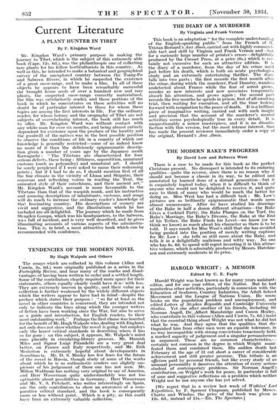Harold Wright was best known as for many years assistant-
editor, and for one year editor, of the Nation. But he had numberless other activities, particularly in connexion with the Education of Seafarers, Country Industries, the Adult School Movement and the League of Nations Union. He wrote books on the population probleni and unemployment, and edited Letters of Stephen. Reynolds and Cambridge University Studies. Yet one after another of his friends, including Sir Norman Angell, -Dr. Albert Mansbridge and Canon Mozley, who contribute to this volume (Allen and Unwin, 7s. 6d.) insist that the essential thing about Wright was not what he did but what he was. And they- agree that the qualities that dis- tinguished him from other men were an equable tolerance, in no way incompatible with strong convictions tenaciously held, a marked sagacity of judgement and a singular persuasiveness in argument. These are no common characteristics,— certainly not common in the degree in which Wright mani- fested them and combined them. His sudden death last February at the age of 51 cut short a career of considerable achievement and still greater promise. This tribute is an officium paid by personal friends, but like every study of an unusual personality it deserves the attention of every serious student of contemporary problems. Sir Norman Angell's contribution, on Wright's work for peace, in particular is full of sane and suggestive reflections on a problem which neither Wright nor he nor anyone else has yet solved.
[We regret that in a review last week of Watkins' Last Expedition, by F. Spencer Chapman, published by Messrs. Chatto and Windus, the price of the book was given as 12s.. 6d., instead of 15s.—En. The Spectator.]










































 Previous page
Previous page